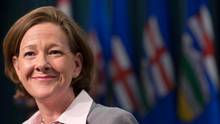Redford on Northern Gateway: 'We will not share royalties' with B.C.
 Alberta isn’t prepared to consider sharing any kind of resource revenue with British Columbia, its premier says.
Alberta isn’t prepared to consider sharing any kind of resource revenue with British Columbia, its premier says.Speaking Tuesday morning at an annual pancake breakfast at the Alberta legislature, and shortly before departing to premiers’ meetings in Halifax, Alison Redford rebuffed B.C.’s day-old demand that more money – an unspecified “fair share” – be included if it’s to support the proposed Northern Gateway pipeline.
“We will not share royalties, and I’ve seen nothing else proposed, and would not be prepared to consider anything else at this point in time,” Ms. Redford said Tuesday, after flipping gluten-free pancakes (for which B.C.-made syrup was provided), mingling with attendees and joining her caucus in a rendition of John Denver’s Country Roads. She acknowledged it’s unclear what B.C. means by “fair share,” and whether it’s a request of Alberta or Ottawa.
“We’re not even clear at this point in time, and that’s fine, but from my perspective I’m not going to sit back and wait for the conversation to continue to be defined without ensuring that Albertans and Canadians understand what Alberta’s position is. And that is that we’ll continue to protect the jurisdiction we have over our energy resources,” Ms. Redford said.
Ms. Redford met B.C. Premier Christy Clark privately last Thursday in Edmonton. The meeting was unannounced and saw Ms. Redford’s security detail help Ms. Clark duck out a side door to avoid reporters. The two are set to meet again as premiers gather for meetings beginning Wednesday. Ms. Redford’s pitch for a “Canadian Energy Strategy” will be a major discussion point, one that will now surely involve her showdown over royalty sharing with B.C.
“She said it, and we’ll have to deal with it at the council,” Ms. Redford said. It was, however, two of Ms. Clark’s cabinet ministers who outlined the demands, not the premier herself. One of the discussions during the Halifax meetings will be the state of Confederation, a topic led by Quebec’s Jean Charest.
“There’s no doubt some of the comments that we’ve heard yesterday from British Columbia will probably really bring that discussion to the floor,” Ms. Redford told reporters.
“…When we start looking at each particular commercial project from the perspective of what the economic benefit might be to the province, that means that every single time you have an economic project or commercial project, there has to be a renegotiation of the balance sheet. It’s not how Canada has worked. It’s not how Canada has succeeded. And I’m disappointed to hear that.”
Underpinning the clash is a ticking electoral clock in B.C., where voters will go to ballot boxes next year. Polls show NDP leader Adrian Dix, who flatly opposes Northern Gateway, on track to oust Ms. Clark’s Liberals and become premier. If Ms. Redford wants B.C.’s help on the project, she’ll either need to strike a quick deal or hope Ms. Clark’s fortunes turn around.
Ms. Redford told the Globe Monday evening that B.C. has other options for raising revenue. “There are a lot of decisions the province of B.C. can make that will allow for people in B.C. to perhaps attain greater benefit, but those are decisions that need to be made within the province of British Columbia. If they decide to increase export taxes or something, that’s up to them,” she said.
Ottawa supports the pipeline, saying accessing Asian markets for Canadian energy is critical to the national economy.
In statements Monday, both the Prime Minister’s Office and Natural Resources Minister Joe Oliver steered clear of weighing in on the spat between Alberta and B.C., with Mr. Oliver saying simply: “We look forward to working with the provinces to secure the long-term prosperity of Canada.”
The proposed pipeline would carry Alberta oil – both refined crude and diluted oil sands bitumen – to the northern B.C. coast, where it would be loaded onto tankers. Critics say the risk of a spill outweighs the economic benefit to government, which one consultant’s report estimates at $81-billion over 30 years. About 8 per cent of that revenue was projected to go to the B.C. government.
Enbridge last week pledged an additional $500-million for safety precautions along the route, while Alberta announced an external review of its pipeline system.
You can return to the main Market News page, or press the Back button on your browser.

